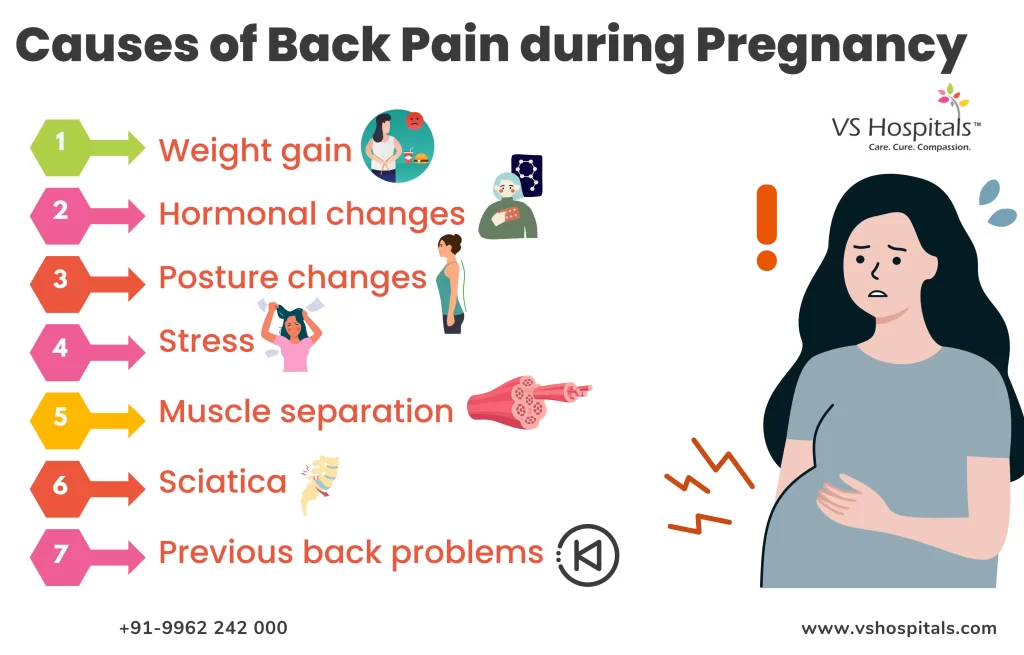
Pregnancy is a beautiful journey, but it can also come with its fair share of discomfort, particularly back pain. Many pregnant women experience back pain as their bodies undergo significant changes to support the growing baby. Understanding the causes of pregnancy-related back pain and exploring safe relief methods can help expectant mothers navigate this phase with greater comfort.
Common Causes of Pregnancy-Related Back Pain
- Hormonal Changes: During pregnancy, the body produces a hormone called relaxin, which helps loosen the ligaments in preparation for childbirth. While this is essential for delivery, it can also lead to instability in the spine and pelvis, contributing to back pain.
- Weight Gain: As the pregnancy progresses, the body gains weight, placing additional stress on the back muscles and spine. The extra weight can lead to strain and discomfort in the lower back.
- Posture Changes: As the belly grows, the center of gravity shifts, which can cause expectant mothers to alter their posture. Poor posture can lead to muscle imbalances and increased strain on the back.
- Muscle Separation: The abdominal muscles may stretch and separate to accommodate the growing uterus, which can affect the support provided to the spine.
- Increased Activity: Many pregnant women feel compelled to remain active or take on additional tasks, which can lead to muscle fatigue and strain, particularly in the back.
Safe Pain Relief Techniques for Pregnant Women
When it comes to relieving back pain during pregnancy, safety is the top priority. Here are several safe methods to alleviate discomfort:
- Heat and Cold Therapy: Applying a warm compress or heating pad to the lower back can help relax tense muscles. Conversely, cold packs can reduce inflammation and numb pain. Always ensure that the temperature is comfortable and avoid direct contact with the skin.
- Gentle Stretching: Engaging in gentle stretching exercises can help relieve tension in the back. Simple stretches that target the lower back and hips can provide significant relief.
- Prenatal Massage: Seeking a qualified prenatal massage therapist can help alleviate tension in the back and promote relaxation. Always consult with your healthcare provider before scheduling a massage.
- Acupuncture: Some women find relief from back pain through acupuncture, which involves the insertion of thin needles at specific points on the body. Ensure you choose a practitioner experienced in treating pregnant women.
- Mindfulness and Relaxation Techniques: Techniques such as deep breathing, meditation, and prenatal yoga can help reduce stress and tension, contributing to overall pain relief.
Exercises and Products to Support Back Health During Pregnancy
Staying active is important for overall health during pregnancy, but certain exercises can specifically support back health. Here are some effective exercises and supportive products:
Recommended Exercises:
- Pelvic Tilts: This exercise helps strengthen the abdominal muscles and relieve back tension. Start on your hands and knees, then gently arch your back towards the ceiling and then lower it towards the floor, repeating several times.
- Cat-Cow Stretch: While on your hands and knees, alternate between arching your back (like a cat) and sinking your belly toward the ground (like a cow). This gentle stretch helps maintain flexibility in the spine.
- Child’s Pose: This yoga pose can stretch the back and hips. Start on your hands and knees, then sit back on your heels and reach your arms forward, resting your forehead on the ground.
- Wall Sits: Stand against a wall and slide down until your knees are at a 90-degree angle. Hold for a few seconds and then rise back up. This helps strengthen the legs and lower back.
Supportive Products:
- Pregnancy Pillows: A good pregnancy pillow can provide support for the back and help maintain a comfortable sleeping position. Look for U-shaped or C-shaped pillows that contour to the body.
- Supportive Maternity Belts: Maternity support belts can help relieve pressure on the lower back and provide stability as the belly grows.
- Ergonomic Chairs: If you work at a desk, invest in an ergonomic chair that supports the lower back. Consider using a cushion for added support.
- Footrests: Using a footrest can help improve posture and reduce strain on the back while sitting for extended periods.
Conclusion
Back pain during pregnancy is a common experience, but there are effective and safe relief methods available. By understanding the causes of back pain and utilizing safe techniques, exercises, and supportive products, expectant mothers can find comfort and maintain their well-being throughout their pregnancy. Always consult with a healthcare provider before starting any new exercise or treatment to ensure it’s appropriate for your specific situation. Embrace this transformative time in your life with the knowledge that relief is within reach

